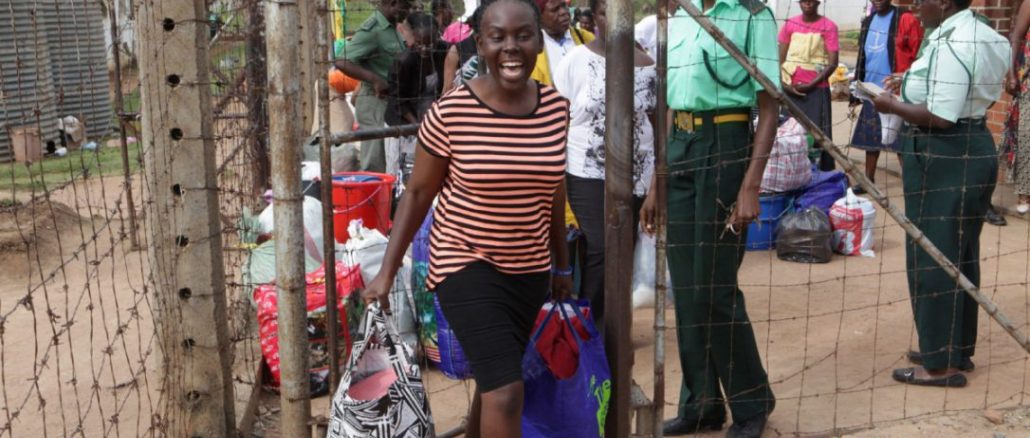Norton-based Jedidiahh Trust and their partner, philanthropist, and educationist Gertrude Mandizvidza, have welcomed the fact that President Emmerson Mnangagwa has pardoned all female convicts, juveniles under the age of 18 years, inmates sentenced to life in imprisonment and prisoners aged 70 years and above.
Jedidiah Trust, founded by Lovemore Chikwanda, focuses on providing education, psycho-social support, a start-up for those released from prison and lobbying and advocacy for better policies.
It works with various stakeholders who are willing to partner the trust to bring hope to the inmates whose hope would have been dashed through incarceration. In addition to this, the trust conscientises the society on remembering their own who would have been incarcerated and works to address massive stigma and discrimination against the incarcerated.
President Emmerson Mnangagwa yesterday cancelled the sentence for all convicted female prisoners, of juvenile prisoners under the age of eighteen (18), and others.
According to Permanent Secretary in the Ministry of Justice, this was announced in General Notice 673 of 2020 in line with the Constitution of Zimbabwe under Clemency Order 1 of 2020.
“The news of the Presidential Pardon was sweet music to our ears. During our visit to the Chikurubi Female Prison in January, there were many incarcerated women who were staying there with their children. These children were literally serving the prison terms with their mothers despite the fact that they are innocent.
“While in prison, these children missed out on good things that life offers. It means their rights were trampled upon. They were deprived of the rights to education, proper shelter, clothing, a balanced diet, the family set up love and food. From a sociological perspective, these children lacked socialisation with their peers. Our plea to policymakers and society at large is to look into the welfare of these children and craft policies for rehabilitating such children since their mothers have been pardoned by President Mnangagwa,” Mrs. Mandizvidza said.
Below is Virginia Mabiza’s reading out of the Presidential Pardon:
It is hereby notified that His Excellency the President has, in terms of section 112(1)(a) and (d) of the Constitution of Zimbabwe, made the order set out in the Schedule:
1. This order may be cited as the Clemency Order No. 1 of 2020. Remission of sentence for all convicted female prisoners
2. Full remission of the remaining period of imprisonment is hereby granted to all female prisoners, save for those convicted of specified offences. The inmate should have served at least half of her sentence.
Remission of sentence for all juveniles
3. Full remission of the remaining period of imprisonment is hereby granted to all juvenile prisoners under the age of eighteen (18), save for those convicted of specified offences. The prisoners should have served at least one-third of his or her sentence.
Remission of sentence for prisoners serving an effective sentence of 36 months and below
4. Full remission of the remaining period of imprisonment is hereby granted to all those prisoners serving an effective period of thirty-six (36) months and below and who would have served half of their sentence by the date of gazetting of this Clemency Order, provided they are not excluded from benefitting in terms of paragraphs 11 and 12. Remission of sentence on medical grounds
5. Full remission of the remaining period of imprisonment is hereby granted to all prisoners who have been bedridden for a prolonged period without recovery upon certification by a Correctional Medical Officer or a Government Medical Officer. The Department of Correctional Service should liaise with social welfare so that a commitment for providing medication is attained. Remission of sentence for prisoners at the Open Prison
6. Full remission of sentence is hereby granted to all prisoners serving a term of imprisonment at the Open Prison regardless of offences committed.
Remission of sentence for prisoners aged 70 years and above
7. Full remission of sentence is hereby granted to all prisoners aged seventy (70) years and above, and who have served half of their sentence by the date of gazetting of this Clemency Order, save for those convicted of specified offences.
8. Full remission of sentence is hereby granted to all prisoners who have served life imprisonment for at least twenty-five (25) years. This include —
(i) prisoners sentenced to life imprisonment;
(ii) prisoners whose sentences were commuted from death to life imprisonment; and
(iii) prisoners whose sentences were altered to life imprisonment on appeal or review. The 25-year period shall include any period spent under the sentence of death.
Commutation of death sentence to life imprisonment
9. A commutation of death sentence to life imprisonment is hereby granted to all prisoners who have been on the death row for at least ten years and above. Quarter remission of sentence for prisoners serving effective sentence above 36 months
10. Prisoners serving an effective period of imprisonment of more than thirty-six months who have served a third of their remaining sentence are hereby granted an additional one-quarter remission of the remaining effective period of imprisonment. Prisoners excluded from the proposed amnesty
11. The following persons are excluded from the amnesty:
(a) any prisoner who was previously released on amnesty;
(b) any prisoner serving a sentence imposed by a Court Martial;
(c) any prisoner who has a record of escaping from lawful custody;
(d) any prisoner convicted of committing any specified offence. Definitions
12. For the purposes of this amnesty — “specified offence” means —
(a) murder, treason;
(b) rape or any sexual offence;
(c) carjacking, robbery;
(d) stock theft;
(e) public violence;
(f) any conspiracy, incitement or attempt to commit any of the offences referred to in paragraph (a), (b), (c), (d) or (e);
(g) being an accessory after the fact to any of the offences referred to in paragraphs (a), (b), (c), (d) or (e)
GIVEN under my hand and seal at Harare this twenty-fourth of March, in the year of Our Lord two thousand and twenty.
